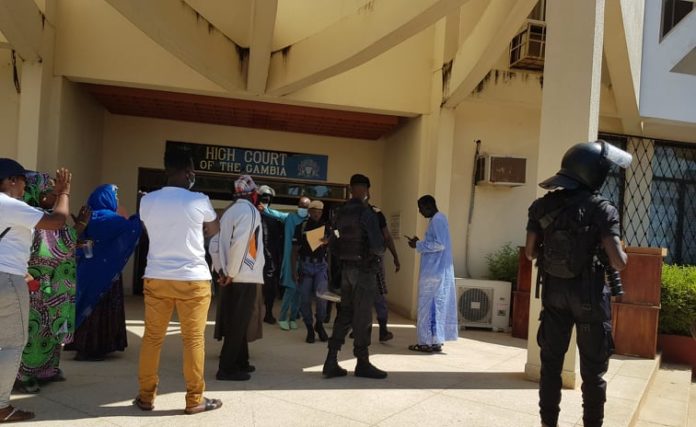Lawyers spent nearly two hours sparring over the immunity claim of former AFPRC junta leader Yankuba Touray whose immunity protest has now made it to the Supreme Court.
Five Supreme Court Justices led by the country’s top justice Hassan B Jallow listened attentively and jotted as lawyers argued it out on Friday in a matter that could see the Supreme Court set precedent.
The high court in Banjul had last month referred the issue to the Supreme Court as Yankuba Touray continued to stand his ground that the constitution protects him from prosecution for any act committed or otherwise while the junta was in power. He took this position shortly after he was charged with the murder of Ousman Koro Ceesay by the state.
“The issue of immunity is to protect people from alleged crimes. They are a shield from unknown, they are not defences,” Touray’s lawyer Abdoulie Sissoho in trying to convince the court of the former local government minister’s protection by the constitution said in one instance. He had earlier argued the constitution is the ‘very foundation of our nation and we choose to be governed by the said constitution’.
In another moment during his argument, he said: “The purpose of Paragraph 13 [of the Second Schedule of 1997 constitution], my Lord… covers both felonies and misdemeanours and offences punishable by death and life imprisonment.”
The lawyer then argued that in order to appreciate Paragraph 13 which Yankuba Touray is relying on, one has to look at Paragraph 13 (2) which deals with felony and misdemeanour crimes. He insisted a coup d’état is punishable by death.
Touray’s lawyer at some point in his argument went after a group of lawyers who said they have taken up the case to help the court take a good conclusion. Sissoho blasted various parts of their argument among them the issue of international law and what happened elsewhere in the world that looked similar to Yankuba Touray’s case and how they ended. Touray’s lawyer insisted The Gambia wasn’t bound by what transpired in some foreign land.
“It’s an issue of national importance. It’s all about assisting the court in coming to a good conclusion,” Gaye Sowe who led a four-man team of friends-of-the-court lawyers said in his argument.
He said elsewhere in his argument: “You cannot rely on immunity if the issue is a human rights issue. Right to life is not only guaranteed in Section 18 of the 1997 constitution but also the African Charter on Human and People’s Rights…” He had throughout insisted it’s a human rights violation that has occurred in the death of Ousman Koro Ceesay and so the state was obliged to have it investigate, prosecuted where applicable and ensure remedy.
The lawyer prosecuting Touray AM Yusuf during his argument said the crime Yankuba Touray was charged with is murder and any person who committed such act needed to be punished.
“…circumstances in which the said Koro Ceesay was deprived of his life was not defined as official duty under Section 18 of the constitution,” Yusuf argued at one point, amid difficulty in hearing him clearly from the back of a packed courtroom.
The supreme court is now set to deliver judgment over whether Touray’s position has any base at all.
Touray is standing trial for the June 1995 murder of former finance minister Ousman Koro Ceesay.




